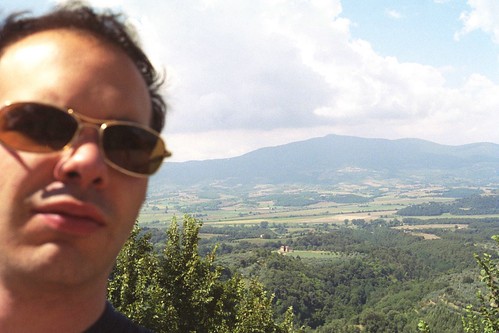
I decided a while back to re-read Creative Evolution with absolute concentration, pencil and notebook in hand, so that each sentence and long form logic was understood to the best of my ability. The process has been nearly transcendental. A friend of mine made a good point - reading philosophy is an experience like listening to music - in other words, the journey is the point. Getting the "gist" or reading second hand analysis is certainly no substitute.
So the process has been slow, but I enjoy it tremendously. I need to type out a passage that has hovered over my brain for the past week.
It must not be forgotten that the force which is evolving throughout the organized world is a limited force, which is always seeking to transcend itself and always remains inadequate to the work it would fain produce. The errors and puerilities of radical finalism are due to the misapprehension of this point. It has represented the whole of the living world as a construction, and a construction analogous to a human work. All the pieces have been arranged with a view to the best possible functioning of the machine. Each species has its reason for existence, its part to play, its allotted place; and all join together, as it were, in a musical concert, wherein the seeming discords are really meant to bring out a fundamental harmony. In short, all goes on in nature as in the works of human genius, where, though the result may be trifling, there is at least perfect adequacy between the object made and the work of making it.
Nothing of the kind in the evolution of life. There, the disproportion is striking between the work and the result. From the bottom to the top of the organized world we do indeed find one great effort; but most often this effort turns short, sometimes paralyzed by contrary forces, sometimes diverted from what it should do by what it does, absorbed b the form it is engaged in taking, hypnotized by it as by a mirror. Even in its most perfect works, though it seems to have triumphed over external resistances and also over its own, it is at the mercy of the materiality which it has had to assume. It is what each of us may experience in himself. Our freedom, in the very movements by which it is affirmed, creates the growing habits that will stifle it if it fails to renew itself by a constant effort: it is dogged by automatism. The most living thought becomes frigid in the formula that expresses it. The word turns against the idea.
The letter kills the spirit. And our most ardent enthusiasm, as soon as it is externalized into action, is so naturally congealed into the cold calculation of interest or vanity, the one takes so easily the shape of the other, that we might confuse them together, doubt our own sincerity, deny goodness and love, if we did not know that the dead retain for a time the features of the living.
The profound cause of this discordance lies in an irremediable difference of rhythm. Life in general is mobility itself; particular manifestations of life accept this mobility reluctantly, and constantly lag behind. It is always going ahead; they want to mark time. Evolution in general would fain go on in a straight line; each special evolution is a kind of circle. Like eddies of dust raised by the wind as it passes, the living turn upon themselves, borne up by the great blast of life. They are therefore relatively stable, and counterfeit immobility so well that we treat each of them as a thing rather than as a progress, forgetting that the very permanence of their form is only the outline of a movement. At times, however, in a fleeting vision, the invisible breath that bears them is materialized before our eyes. We have the sudden illumination before certain forms of maternal love, so striking, and in most animals so touching, observable even in the solicitude of the plant for its seed. This love, in which some have seen the great mystery of life, may possibly deliver us life's secret. It shows us each generation leaning over the generation that shall follow. It allows us a glimpse of the fact that the living being is above all a thoroughfare, and that the essence of life is in the movement by which life is transmitted.
=Henri Bergson, Creative Evolution, pp. 126-128
Maybe it was my own state of mind, but this passage seemed to jump out at me as a fairly clear change of style and prose, particularly that bit about the "deny goodness and love if we did not know that the dead retain for a time the features of the living." Once he follows up with his ditty on the essence of what love is: life recognizing life - the whole thing starts to feel pretty good. I almost imagine Bergson sipping his scotch and really getting into these few pages (actually I get the impression that he didn't drink, especially when he talks about the effects of alcohol on the reproductive system, but I don't know for sure). It is really such a remarkable book, swirling together the mysteries and certainties of science, logic, and the ineffable.



